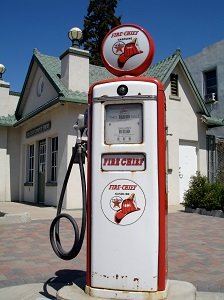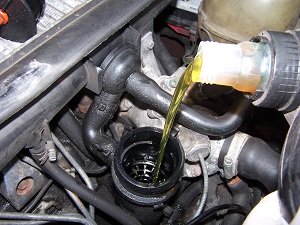Squeeze a Few More Miles Out of That Gallon of Gas
December 17th, 2015
If you’re past “a certain age,” you might remember when gas was $1.50 per gallon, or $1.00 per gallon, or 59 cents, or what-have-you…but the truth is that everything has gotten more expensive. After all, when gas was $1.00 per gallon, a nicely tricked-out Chevrolet Caprice Classic was selling for about $6,000 brand new.

Now that we’re well into the 21st century, gas prices are likely to fluctuate, but one thing’s for sure: gas is likely to never be “cheap” again. We know that everyone’s trying to get a little more out of every dollar, and whether you’re driving a big SUV or a subcompact, there are things you can do to help your vehicle’s fuel economy:
Posted in:
Auto Repair 101
Benefits You Didn’t Know About Oil Changes
July 15th, 2015
Automotive technology has come a long way since the mid-20th century, and so has motor oil. A 1940s-era car didn’t feature an oil pump or oil filter. Instead, they relied on dippers on the crankshaft’s counterweights, which would then sling oil to coat crucial moving parts. Motor oils in those days weren’t designed with detergents and other additives to help keep the engine clean; even with frequent oil change intervals, many cars would be in need of an engine overhaul by the time they reached 80,000 miles.

Today’s motor oil formulations incorporate additives to suspend contaminants in the oil so they can easily be trapped by the oil filter. Here are a few other facts about motor oil you may not have known:
...[more]
Tags:
car maintenance, engine maintenance, auto services, preventative maintenance, tune up, oil change, oil change service
Posted in:
Auto Repair 101
Why Schedule Regular Oil Changes For Your Vehicle?
March 5th, 2015
 Many vehicle owners do not take the time to schedule regular oil changes. Regular oil changes are vital to the life of your engine and can extend its performance for years. This is one of the most important and inexpensive things you can do to keep engine protected. Most manufacturers recommend changing your oil every 3,000-6,000 miles, depending on your vehicle use and the type of oil you are using.
Many vehicle owners do not take the time to schedule regular oil changes. Regular oil changes are vital to the life of your engine and can extend its performance for years. This is one of the most important and inexpensive things you can do to keep engine protected. Most manufacturers recommend changing your oil every 3,000-6,000 miles, depending on your vehicle use and the type of oil you are using.
Oil Changes are essential to:
- Lubricate engine to reduce wear and friction
- Reduce engine temperatures
- Maintaining proper engine function
With regular oil changes your engine will be protected against much of the harm normal wear and tear will cause. Parts will stay cleaner with less corrosion, which means with regular upkeep there will b ...[more]
Posted in:
Auto Repair 101
Categories
Archives
Tags
auto services auto service oil change Mother's Day brake service air conditioning service auto repair mechanics battery inspections tune up service tire rotation oil changes safe driving tips car battery check engine light auto repair automotive repair services car repair preventative maintenance service ac repair service recharge ac ac service air conditioning car service car maintenance wheel alignment new tires buy tires tires tire replacement car tire repair tire repair all season tires summer tires preventative maintenance driver safety back to school fuel economy tire maintenance rotate tires tire rotation service tire rotation benefits tread wear safe tires tire pressure brakes brake repair tire inflation driving tips vehicle lights headlights brake lights holiday travel tire alignment tune up engine maintenance auto repair services tire balancing car alignment break service Car Energy Savers ac repair truck tires car tires oil change service spare tires auto repair service automotive repair truck repair preventative flush service winter driving winter winter tire tips spare tire car spare tire truck spare tire winter tires snow tires snow and winter tires winter tire decisions winter tire help winter tire guide heating repair vehicle energy saver mpg gas mileage mileage buy snow tires buy winter tires winter tire benefits winter driving tips safe vehicle mechanic truck tire repair mechanics auto mechanics auto mechanic tire technology tire store tire center flat tires flat tire repair tire facts
